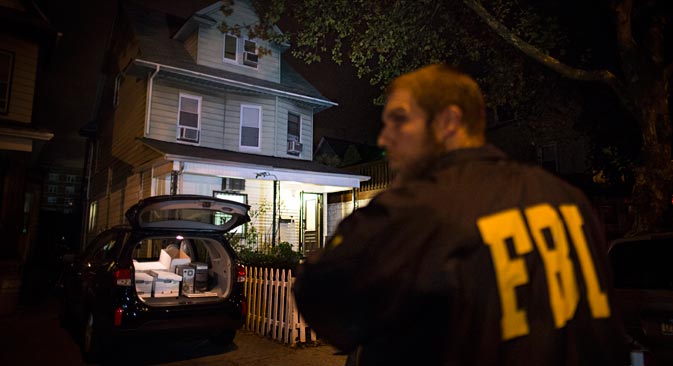
Looking for spies? Source: AP
On Oct. 23, The Washington Post reported that the FBI was allegedly investigating the Russian Cultural Center in Washington, DC and its head, Yuri Zaitsev, of attempting to recruiting Americans for Russian intelligence agencies.
According to reports, the FBI is questioning some Americans who have participated in trips to Russia sponsored by the center, although this information has not been confirmed or denied by the FBI.
Eugene Horishko, press secretary of the Embassy of the Russian Federation in Washington said that the allegations regarding the Russian Cultural Center in the United States are an attempt to throw dirt on its activities and that the center will continue its work.
Russia urges U.S. goverment to distance itself from media reports on Culture Center's activities
In addition, Mother Jones magazine reported that Rossotrudnichestvo — the Russian agency in charge of the country’s soft power initiatives — is organizing internships in Russia for American citizens for recruitment of agents of the Russian secret service will be recruited.
Russian authorities have denied the allegations.
“These kinds of shockers really remind me of the Cold War. There is an open attempt to misrepresent and blacken the activity of the Russian Cultural Center, which is actually directed toward the cultivation of trust and cooperation between our countries and nations,” a representative of the diplomatic mission said in an interview with Russian news agency RIA Novosti.
Horishko made similar statements about the center's activites, stating: “The Russian Cultural Center has been working on expanding the contacts between Russian and American citizens, and that's what we will continue doing,” said Horishko.
Last summer, RBTH interviewed Zaitsev about the center's educational programs. At that time, Zaitsev said that the purpose of the two-year-old program for young professionals that has allegedly been the target of the FBI investigation was to show American youth the culture of modern Russia.
“The first group of 50 people departed for Russia in December 2011 and spent two weeks in Moscow and St. Petersburg, completely at the expense of the Russian Federation. In 2012, we were able to send two groups of 25 people, but, this time, one of the groups was able to visit not only Moscow but also Kazan. On Aug. 6, there was one more delegation that had the chance to visit Moscow and Kaluga,” said Zaitsev.
“American youth organizations help find people for this program. The average age of our candidates is 25–35 years.We usually chose those who are active and who take part in public activity or business activity,” Zaitsev said.
“It is interesting that most of them have nothing to do with Russia: They often work as assistants to mayors, senators, in the administration of cities and states. This is the second year in a row that one of the senators from Oklahoma will fly to Russia.”
Participants are chosen based on applications. Rossotrudnichestvo does not adjust the program or divide participants based on their professions.
“We have come to the conclusion that this is not necessary, due to the fact that we show all young specialists, whoever they are — journalists, politicians, businessmen the same thing — the work of government bodies, of ministries, the administration of the president, universities, tourist attractions and museums. Besides this, we always organize a meeting with students of local universities,” said Zaitsev.
After the trip, the center asks them to share their impressions of Russia, but nothing is required of them. “They usually post the most interesting information while actually being in Russia. Most travelers post photographs and just simple blog posts in their social networks about the places that have made an impression on them. When I hear about their adventures, I too want to take part in this program and learn more about Russia,” Zaitsev said.
In addition to these trips for young professionals, the Russian Cultural Center takes winners of different contests and teachers of Russian to Russia.
“A while ago, we organized an essay contest on the following topic: ‘400 years of the Romanov family.’ Nine laureates and one professor from the American University came to St. Petersburg in August to see for themselves the places of the czar's family,” said Zaitsev.
The activities of the Russian Cultural Center in the United States are not unique: Such trips for youth are organized by many international organizations and states, including NATO, the Council of Europe, the UK, Norway, India, Israel, Germany, the U.S., France and Japan.
Since 2011, Rossotrudnichestvo (formally known as the Federal Agency for the Commonwealth of Independent States, Compatriots living abroad and International Humanitarian Cooperation) has been the state coordinator of short educational trips to the Russian Federation for young representatives of political, social, business and scientific organizations in foreign states.
According to an official statement about the program, the main purpose of these trips is to assist in shaping objective perceptions about the changes taking place in Russia and to expand the open-mindedness of international youth toward Russia.
All rights reserved by Rossiyskaya Gazeta.
Subscribe
to our newsletter!
Get the week's best stories straight to your inbox